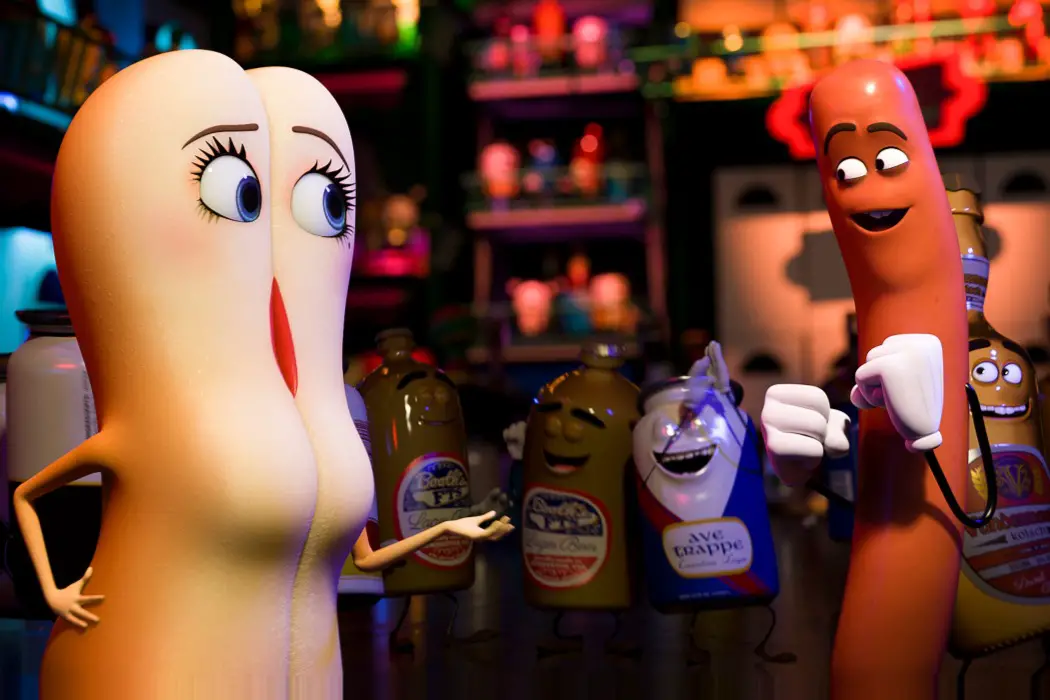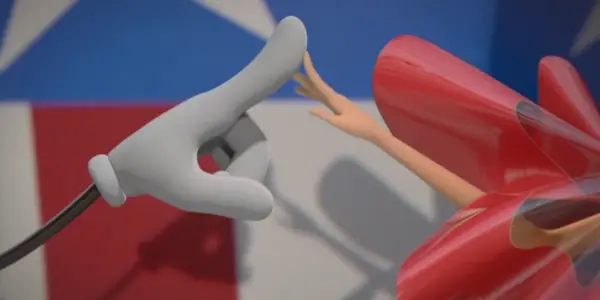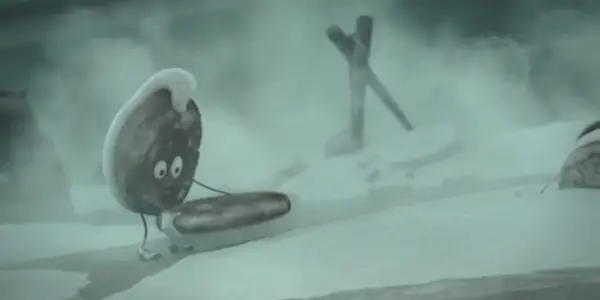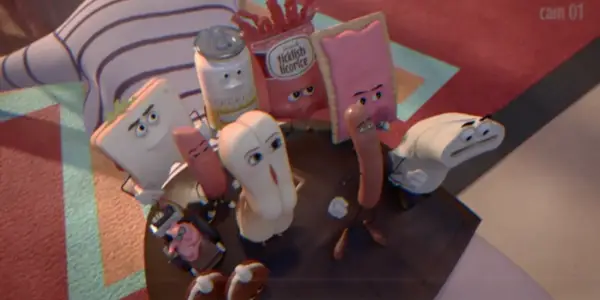Film & Philosophy: The Ambiguous Politics Of Dionysian Pessimism In SAUSAGE PARTY

Lance Conley is a PhD candidate in English at Michigan…
“You’re celebrating your doom! Wake up!…It’s all a lie. Everything you’ve been told! Everything you believed in!”
The source of the above lines is worth keeping anonymous for the moment. For now, let’s consider another:
“God is dead! God remains dead! And we have killed him! How can we console ourselves, the murderers of all murderers! The holiest and the mightiest thing the world has ever possessed has bled to death under our knives: who will wipe this blood from us?”
The latter quotation appears in Friedrich Nietzsche’s “The Madman,” a short piece on what Nietzsche calls “the death of God,” a topic discussed throughout his writings. The former comes from a jar of Honey Mustard (appropriately named as such) in Greg Tiernan and Conrad Vernon’s animated adult comedy, Sausage Party.
Worth addressing now is this rather odd pairing — that is, the writing of Nietzsche and the utterances of an anthropomorphized condiment in a raunchy animated film. Focusing on the productive and problematic aspects of both, this article aims to prove both the undeniable intelligence and ambiguous politics of Sausage Party by reading the film through Nietzsche’s philosophy, with a little help from Plato as well. This piece ultimately serves as the first in a series of discussions entitled Film and Philosophy. These articles will attempt to generate a productive dialogue between various films and philosophical texts in the name of furthering the trans-historical scope of the former, while making the latter easier to grasp for more readers. With that goal in mind, let’s dive into the film.
Sausage Party: A Vulgar Fable on the Death of God
Sausage Party depicts the narrative of anthropomorphized food products and their attempts to make it to The Great Beyond, a Heaven-like location in which the human customers—what the food products call “the Gods”— that patron their Shopwell’s grocery store will provide for them in an eternity of tranquility and peace. Each morning, all of the food products sing “The Great Beyond,” a song of praise and worship directed at their perceived Gods that goes as follows:
Dear Gods you’re so divine in each and every way to you we pray,
Dear Gods we pledge our love to you forevermore,
We always felt we had a special bond,
Take us to the great beyond,
Where we’re sure nothing bad happens to food,
Once we’re out the sliding doors things will all be grand,
We will live our dreams together in the promised land.
The Gods control our fate so we all know we’re in good hands,
We’re super sure there’s nothing shitty waiting for us in The Great Beyond.
The song serves as a daily ritual of devotion that the foods practice unquestionably. In their eyes, the Gods are benevolent beings that will love them eternally yet remain oddly selective. Accordingly, along with participating in this monotonous musical performance, some of the food products abstain from sexual intercourse before leaving the Shopwells, so as to please the Gods and remain “fresh” via this display of virtue.
While the thought of sentient food products engaging in sexual intercourse is undoubtedly absurd and honestly just gross, the target for the film’s satire remains rather clear. The opening scenes of Sausage Party establish a certain comedic derision for organized religion, especially its required rituals and archaic prohibitions. The tone of both the song and an early conversation between two central characters, Frank, a hotdog, and, Brenda, a hotdog bun, reveals the film’s blatant satirizing of sexual abstinence practiced in the name of pleasing a deity whose love for its creations is determined by their behavior, specifically when they decide to copulate. Frank and Brenda decide that “touching tips” is fine—sticking their fingertips outside of their respective packages and touching each other’s fingertips—and that “nothing bad has ever happened from just touching the tips.” The camera pushes in on the separate fingertips touching for the first time, emphasizing its importance.

The moment functions as Sausage Party’s fall of food—that is, an adaptation of the Fall of Man narrative seen in both the book of Genesis and Jonathan Milton’s Paradise Lost. Immediately following Frank and Brenda’s forbidden touch, the film cuts to a customer returning Honey Mustard to the store, rejecting him from the Great Beyond and thus the Gods’ love from the perspective of the other foods. The precise editing reads as a reference to the way that Adam and Eve were immediately distanced from God after eating the dreaded apple in the Garden of Eden, to the point at which God literally could not see them. However, Sausage Party is not a creation myth but a destruction narrative.
When Honey Mustard attempts to tell the other food products on the shelf about what actually happens in the Great Beyond—the Gods eat food—the film cuts to Firewater, a Native American bottle of liquor, who tells Honey Mustard: “So, you have learned the terrible truth. Congratulations, now keep it to yourself, or I’ll slit your throat while you sleep! I swear to God!” Shortly after this confrontation, another customer reselects Honey Mustard for purchase. Rather than resigning to his horrible fate in the Great Beyond, Honey Mustard tells the other food products in the shopping cart, which includes Frank and Brenda, the Gods “won’t get him twice,” screaming “Fuck you, Gods” to the female customer pushing the shopping cart in one of the more striking shots of the film.
Echoes of Plato’s “Allegory of the Cave” come through clearly, as Honey Mustard represents a prisoner that has escaped the cave and seen the reality that exists beyond the projections on the cave’s wall. Or, like Nada from John Carpenter’s They Live or Neo in the Wachowski’s The Matrix Trilogy, who each see the actual reality behind the deceptive fantasy draped over their eyes, Honey Mustard has learned “the truth.” In Plato’s tale, the other prisoners stuck in the cave kill the escaped prisoner when he returns because the forbidden and undesired knowledge he brings with him conflicts with their world views within the cave. He is perceived as a threat and destroyed accordingly. In Sausage Party, Honey Mustard’s outcome differs from Plato’s returned prisoner in one specific way; rather than being murdered, he commits suicide.
After rejecting his fate at the hand of the Gods, Honey Mustard claims he “has a date with oblivion” and leaps out of the shopping cart. With Brenda’s help, Frank is able to grab his legs before he falls and attempts to bring him back into the cart. As Frank tries desperately to hold on, the film cuts to Honey Mustard in close up, as he ridicules Frank’s faith: “Look at you, following all their rules. You have no idea what’s coming.” Frank doesn’t understand, so Honey Mustard tells him to talk to Firewater before plummeting to his death, creating a violent and chaotic scene that reads as a parodic homage to the devastating opening sequence of Steven Spielberg’s Saving Private Ryan.

Frank eventually meets Firewater, as well as Grits, an African-American box of crackers, and Twink, a homosexual Twinkie. Dubbing themselves “the Non-Perishables,” they reveal the horrible truth of the Great Beyond to Frank. This scene is pivotal for many reasons, but the fact that these characters, Firewater, Grits, and Twink, represent repressed minorities in American history is particularly striking and connects directly with Nietzsche’s notion of Dionysian pessimism.
What we have with this narrative setup is evidence that the film’s screenwriters—Evan Goldberg, Kyle Hunter, Seth Rogen, and Ariel Shafir—are familiar with at least a small amount of philosophy; as already suggested, the scene reads as a darker version of Plato’s “Allegory of the Cave.” Sausage Party presents a fable-like diegesis in which non-human objects possess not only consciousness but also an entire religious system. This point cues us in on how we should interpret the film. That is to say, though raunchy to a gratuitous extreme—the film’s final orgy sequence remains one of the more shocking things I’ve ever witnessed—Sausage Party reads like a fable, one with a distinct message that presents itself as a question: what do we do after the Death of God?
What to Do after the Death of God, According to Nietzsche
Throughout his life, Nietzsche consistently returns to the notion of the Death of God, specifically the Judeo-Christian God. He took issue with the concept of such a deity based on its principles of human suffering and eternal guilt and the way that they prevented what he calls humanity’s “will to power,” or the innately human ability to remake the world in our own image every day, turning life into what amounts to an aesthetic project. In “The Madman,” a man declared “mad” by others tells a group of people that we, humanity, have killed God, and he “has bled to death under our knives.” Following his breathtaking speech, the madman “fell silent and looked again at his listeners.” He initially “provoked much laughter,” but after this metaphysical accusation, his listeners “too, were silent and stared at him in astonishment.”
This silence bears implications because it reveals the harsh effects of the madman’s argument on those not yet exposed to the truth. Realizing his error, the Madman claims:
“I have come too early…my time is not yet. This tremendous event is still on its way, still wandering, it has not yet reached the ears of men. Lighting and thunder require time; the light of the stars requires time; deeds, though done, still require time to be seen and heard.”
With this passage, we can see Nietzsche’s acknowledgement of the fact that the act of revealing actual reality beyond the deceptive fantasies draped over it “requires time”; it can be both physically and emotionally painful, and is often met with skepticism, disgust, and violence. For example, consider Neo’s horrifying rebirth in The Matrix and the lengthy back-alley brawl in They Live between Roddy Piper and Keith David. This world-shattering pain is the reason the prisoners in Plato’s Cave kill the returned prisoner as well. Let’s return to Sausage Party to see if we can get a grasp on the implications of Nietzsche’s parable as manifest in the film.
Firewater tells Frank that the Non-Perishables “invented” the Great Beyond. Before their creative act, the rest of the food products at Shopwell’s knew “the awful truth.” Firewater claims it was a “living nightmare” to hear “the screams” of the other food, so they created “a story, the story of the Great Beyond.” Ultimately, he confirms that the selected foods “went out those doors happy instead of shitting themselves” because of their belief in the Great Beyond. The implications of the Non-Perishables’ decision are striking, especially as they relate to Nietzsche’s thought.
The Non-Perishables’, who, as discussed above, appear in the film as stand-ins for repressed minorities in American history, create the Great Beyond for ostensibly compassionate reasons. They did not want the other food products to live in fear of what happens to them after they leave the store. That is to say, the Non-Perishables created the Great Beyond as a means of making the worst case scenario (the afterlife consists of suffering and death at the hands of the Gods) not as harsh for the rest of the food products.
However, if we look closer, one could argue that the Non-Perishables created the Great Beyond in the name of their own survival and because they were tired of hearing “the screams” of the other foods. Firewater says as much when he reveals the truth to Frank, claiming those “screams” were the driving factor in their creation. Indeed, while on the surface the Non-Perishables’ creation of the Great Beyond seems beneficial to themselves and the other food products, a certain ambiguity defines their metaphysical manipulation. And this is where Nietzsche’s thought comes back in and, unfortunately, where things get somewhat troubling with some of his arguments, so let’s clarify a few points.
Similar to how the oppressed in Sausage Party are responsible for the creation of the Great Beyond, for Nietzsche, a similar arrangement structures our shared reality, specifically how we conceive of metaphysical concepts such as good and evil. Nietzsche proposes the concept of “ressentiment,” which he defines as the “imaginary revenge” of “those beings” that are “denied the proper response of action.” In other words, he argues that throughout human history, the weak and oppressed created metaphysical concepts and ideals—good, evil, God, Heaven, etc.—and altered humans values—good is better than evil—as both a means of retaliation against their dominators and preservation of their own lives. Comedian and actor Patton Oswalt calls this creative act “the old sky-cake dodge” in his No Reason to Complain, but Nietzsche was the first to broach the subject and its implications, albeit in a much less funny way.
In Sausage Party, we can read the Non-Perishables’ creation of the Great Beyond as an act of “imaginary revenge” or “ressentiment” against their oppressors. But who are those oppressors? Regardless of how one chooses to answer that question, Sausage Party remains rather ambiguous with regards to a possible political ethos or progressive message. We’ll discuss the film’s atheistic embracing of Dionysian pessimism in its concluding orgy at the end of this discussion, but let’s consider this topic—the film’s ambiguous politics—in more detail first. In short, politically speaking, what is Sausage Party’s message, and how do we reconcile it with its blatant disregard for political correctness?
The Death of God(s) in Sausage Party
As already argued, Sausage Party’s primary theme seems pretty self-evident. The film embraces an atheistic ethos in the face of overwhelming cosmic pessimism. Put differently, on the surface, the narrative looks to be about affirming a compassionate form of atheism, a worldview predicated on a Godless universe and humanity’s ability to accept that fact together, peacefully, and as a community. This point comes through clearly when Frank fails in his first attempt to convince the rest of the food products that the Great Beyond doesn’t exist.
Rather than astonished silence, the other food products respond with vehement disgust and outrage, yelling “we choose the more pleasant thing” and that Frank’s argument is just “a theory!” They react this way because Frank, like Nietzsche’s Madman, forces a harsh fact on his listeners that utterly conflicts with everything they believe and do on a daily basis. Yet again, we’re back inside Plato’s cave, as Frank, following Honey Mustard, is now the returned prisoner attempting to convince the other cave-dwellers of the errors of their beliefs.
Forced to alter his method, Frank reunites with Barry, another hotdog with whom he shared a package. Presenting the head of a human being he and some other foods managed to kill, Barry shows Frank that the Gods are vulnerable and can even be destroyed. This revelation leads to Frank and a few other woke foods leading an assault against some of the staff and patrons at the Shopwells, and, eventually, another attempt at convincing the others to stop worshipping the Gods and join their cause and fight back.
Thanks to the help of a tech-savvy piece of pepperoni pizza, Frank’s speech is broadcast across the rest of the Shopwells. Consider the composition of the following shot, as well as the way Frank begins his rousing speech. Standing atop one of their former Gods that he just killed with his fellow revolutionaries, Frank presents the body to the rest of the Shopwells and yells, “you see, there is hope!” In short, the foods have killed God and can now live their lives the way they choose without fear, guilt, or shame, which has some troubling implications we will discuss shortly.
The Ambiguous Politics of Dionysian Pessimism in Sausage Party
And with this striking sequence, we arrive (finally) at the Dionysian pessimism that defines Sausage Party. Following Frank’s compassionate speech in which he pleads for the values of atheism and deicide—at one point he yells something resembling a call for worker rights, shouting “together we can fight these monsters and take control of our own lives!”—all of the food products in the Shopwells begin an assault on the human customers. This attack must be understood as an act of destruction in that the foods are killing their Gods, destroying the metaphysical structure that previously governed their lives.
In The Gay Science, Nietzsche argues that Dionysian pessimism should be understood in such terms. Rather than facing a Godless universe with debilitating fear or depressed resignation, or worse, delusional optimism, he argues that Dionysian pessimism, as opposed to romantic pessimism, comprises “the desire for destruction, change, and becoming” manifest in an “overflowing energy pregnant with future”. Conversely, Romantic pessimism, denotes “the tyrannic will of one who suffers deeply, who struggles, is tormented, and would like to turn what is most personal, singular, and narrow, the real idiosyncrasy of his suffering, into a binding law and compulsion-one who, as it were, revenges himself on all things by forcing his own image, the image of his torture, on them, branding them with it”.
In other words, Dionysian pessimism sees humanity’s existence a Godless universe not as a reason for dismay, or worse, suicide. Rather, a Dionysian pessimist sees the human condition as an opportunity for change, growth, and ultimately creation. A romantic pessimist sees our existence in much more negative terms and attempts to force this depressing worldview on others.

Sausage Party possesses one such character, a Douche, who blames Frank for his not making it to the Great Beyond, laments his lengthy stay at Shopwells, sees it as evidence for the lack of the Gods’ love for him, and thus tortures the rest of the food products with his maniacal misery. He is eventually destroyed with the humans in the store by the united foods in the film’s final confrontation. Following the foods’ victory, the film cuts to Brenda and Frank, who are left to decide what to do after killing their Gods. As already mentioned, they instigate an orgy amongst all of the food products that captures, in graphic detail, what Nietzsche calls “an excess of procreating, fertilizing energies”. In other words, the characters participate in a Bacchanalian festival of excess driven by the release of their repressed sexual energy after they have killed their Gods.
While the orgy is hard to watch, the sequence by no means comprises a throwaway scene. Rather, in their embracing of Dionysian pessimism and all of its “procreating, fertilizing energies,” the food products blur the boundaries between self and other to the point at which some characters are sexually assaulted. Indeed, it is hard to interpret Grits’ violent copulation with Crackers, a box of saltines, as anything but an act of rape.
On some level, the racial politics of the deed strike true in terms of generating laughter and making a political statement. However, on another, the scene captures the ambiguous politics of Sausage Party’s Dionysian pessimism. This claim is based on the fact that there seems to be no ethos behind including this sequence—Grits raping Crackers—other than as a crude joke in which a synecdoche for an African-American male sexually assaults a stand-in for a Caucasian male. This troubling point returns us to the ambiguity of Sausage Party’s politics because a certain whole in philosophical logic permeates the film’s concluding scenes.
We have already established that the Non-Perishables represent repressed minorities in American history and that they created the Great Beyond for ostensibly compassionate reasons. However, I also argued that it’s not a stretch to claim that they did so because they were tired of hearing the screams of others, as well as for reasons of self-preservation. In other words, the non-Perishables want to stay as such, alive. The question then becomes: why would they want to make the other foods aware of their deceit?
Following the logic of Nietzsche’s philosophy, they wouldn’t. Doing so would allow each product in the store to act out whatever they desire, however violent or vile it may be, including assaulting the Non-Perishables past the point of expiration. Yet, the most violent act of the orgy sequence is Grits’ raping of Crackers. Accordingly, the orgy sequence then seems to suggest that the Non-Perishables, once God has been killed, are just as prone to act out on violent and sexual desires as any other food product in the store.
To get a better grasp on the implications of this claim, let’s consider the film’s final sequence in which Firewater leads Frank, Brenda, the other Non-Perishables, and a handful of other foods to the real world. Revealing that the Great Beyond was merely one lie nestled within an even large one—he reveals to the group that they are all actually cartoons—Firewater convinces the other characters to join him in fleeing their dimension and entering a new reality. The scene serves as an intriguing conclusion to Sausage Party’s narrative of Dionysian pessimism.
We can read the foods’ decision to leave their animated lives behind in terms of an aesthetic will to power. In other words, the food products realize that they are the creations of human beings and thus attempt to destroy yet another illusory reality by embracing their autonomy and, in Firewater’s words, “cutting the strings once and for all.” Nevertheless, once again, we arrive at another whole in the logic of Sausage Party’s philosophy: why would the foods want to leave the reality they just worked so hard to make their own?
They wouldn’t, especially in such small numbers, because to do so would be to reinsert themselves into another humans versus food conflict that they literally just finished winning in their own reality. Accordingly, the trans-dimensional trip at the film’s conclusion falls rather flat in terms of it capturing any larger message or ethos within Sausage Party’s philosophical complexity and political ambiguity. In short, this logical whole in Sausage Party’s Dionysian pessimism is why, finally, its politics must be grasped as, at best, ambiguous, and at worse, apolitical.
That is to say, in its politically ambiguous depiction of Dionysian pessimism, Sausage Party seems to want to have its cake and eat it too. On one hand, the film remains fundamentally invested in critiquing all religions in the name of a compassionate atheism that, in the end, is not so compassionate. On the other, the film’s screenwriters made specific choices about racial representation in the film—a point they were taken to task for by multiple critics—that seem utterly unmotivated by any political statement and appear rather as crude stereotypes possessing no underlying message other than to be perceived as such. Either way, Sausage Party certainly provides audiences with food for thought. Nevertheless, a crucial question remains: is any of it worth eating?
Does Sausage Party offer substantial food for thought?
Does content like this matter to you?
Become a Member and support film journalism. Unlock access to all of Film Inquiry`s great articles. Join a community of like-minded readers who are passionate about cinema - get access to our private members Network, give back to independent filmmakers, and more.
Lance Conley is a PhD candidate in English at Michigan State University. His work looks at the politics of pessimism in various cultural artifacts of the twenty-first century. He has a BA in Film Studies from Georgia State University and has taught multiple courses on the topic at various levels.













